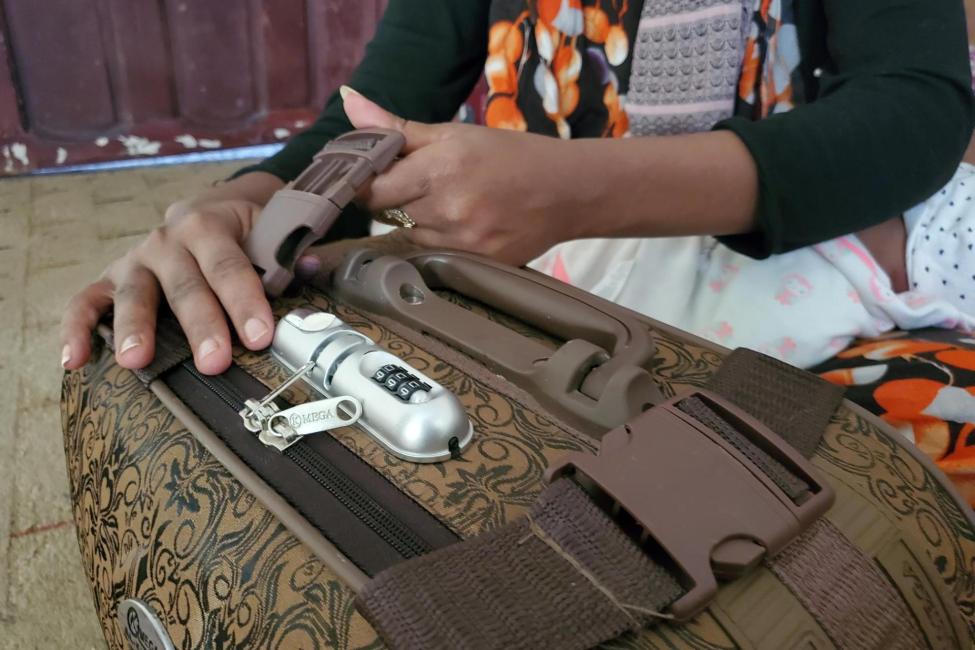After Extreme Hardship, Single Migrant Mothers Supported to Safely Return Home
After Extreme Hardship, Single Migrant Mothers Supported to Safely Return Home
Sana’a – “My journey to Yemen was very difficult, we walked for days, until our shoes and clothes wore out,” recalls Amene* of the grueling journey she embarked on over a year ago with false promises of high earnings and a better standard of living in Gulf Countries.
Amene is one of more than 800 Ethiopian migrants who have safely and voluntarily returned home on flights supported by the King Salman Humanitarian Aid and Relief Center (KSrelief).
The International Organization for Migration’s (IOM) Voluntary Humanitarian Return (VHR) programme offers a lifeline for migrants stranded throughout the country.
Like most migrants who travel on this route, Amene was unaware of the dangers she would face when she reached Yemen: exploitation, extortion, harsh living conditions, among others.
She departed from her home in Ethiopia side by side with her husband, but was separated from him by traffickers who put them in different traveling groups when they reached Djibouti. Since then, her journey became unimaginably difficult.
“They melted plastic on our skin to force our families to send money. When I called my family, no one could help me,” Amene recalled from an IOM-supported shelter.
Here, she met Marsani*, another migrant who took last month’s flight after a similarly harrowing experience of extortion.
She used to work as a merchant – buying and selling clothing between Djibouti and Ethiopia. One day, her goods were seized, and she lost her sole source of income. Traveling to the Gulf to make an income seemed like her next best option to support herself.

"When we arrived to Ataq in Yemen, the traffickers demanded money, but I also could not pay. I was beaten and kept in a yard for three months with hundreds of migrants under very difficult and cruel conditions,” said Marsani who became pregnant while held here against her will.
As Marsani and Amene continued their journeys, their risks grew.
They did not have money to pay the increasing fees demanded by the traffickers, and continued to be subjected to torture and exploitation – eventually forced to work as domestic laborers.
"After arriving in Aden, I was taken to Ma’rib, where I worked as a maid for four months. The traffickers took all the money I worked for. I didn’t get any of it,” said Amene.
Amene still remained positive – hoping and searching for her husband every day. She finally found his phone number from his family and connected with him.
“I called my husband. He paid money so I could leave. I moved to the farm where he was working, so we could work together to pay our debts,” she remembers.
“For a while, the situation was stable. I gave birth to our first child, and I was pregnant with the second,” Amene said, expressing the relief she felt being reunited with her husband.
Then one day, her husband went out and did not come back. The entire village searched for him, but after a while she was told she could not stay there alone.
She has never found out if he is dead or alive.
“They would not allow a pregnant woman to work without her husband. I did not know where to go and how to provide my children’s most basic needs,” Amene said.
The people in the village told Amene to move to Sana’a where she could find relief from humanitarian organizations or civilians in the city.
There, she met a Yemeni-Ethiopian community member who wanted to help. He rented a room for her and provided her and her children with food.
Marsani too was living under the care of a local woman who lent a helping hand.
Both women were pregnant and struggling to make ends meet. Their health conditions were weakening, and they needed more support.
They came to the International Organization for Migration (IOM) and found health workers ready to provide care and other staff who provided them with essential items their babies needed.
After being provided with information about IOM’s Voluntary Humanitarian Return programme, both Amene and Marsani decided their best option was to return home to Ethiopia.
They were put up in a safe shelter until their flights could be arranged. In March, they boarded a flight to travel home.
“I never want to repeat this difficult and dangerous experience. I want to return to my country and find someone to support me to resume my business like before,” said Marsani expressing her hopes for the future.
More than 3,200 Ethiopian migrants stranded in Yemen have been able to embark on lifesaving Voluntary Humanitarian Return flights this year alone.
With support from donors like KSrelief, IOM arranges the flights, offers counselling and medical screenings prior to departure, supports migrants to secure documents and ensures safe passage and transit.
Upon arrival in Ethiopia, returning migrants are provided with accommodation at the IOM transit centre, cash for onward travel to their home community, family tracing and reunification, medical screening and psychosocial support.
IOM’s humanitarian assistance and protection services in response to the needs of the returnees are aligned with the Regional Migrant Response Plan (MRP) for the Horn of Africa and Yemen, 2023. The MRP aims to address the needs of migrants in vulnerable situations and host communities in countries situated along the Eastern Migratory Route, located between the Horn of Africa and Yemen.
*Name has been changed due to sensitivities and protection purposes.

